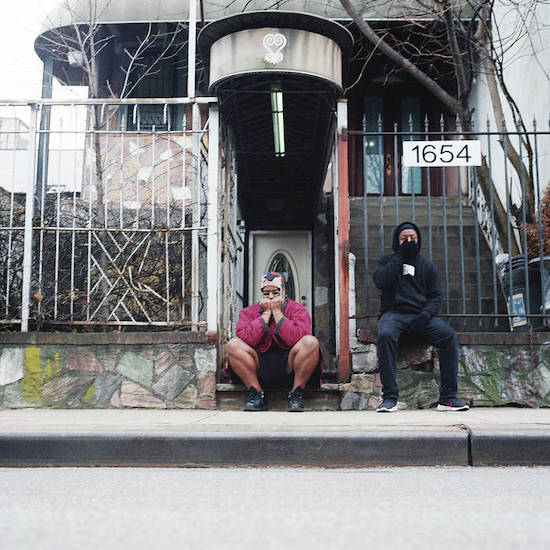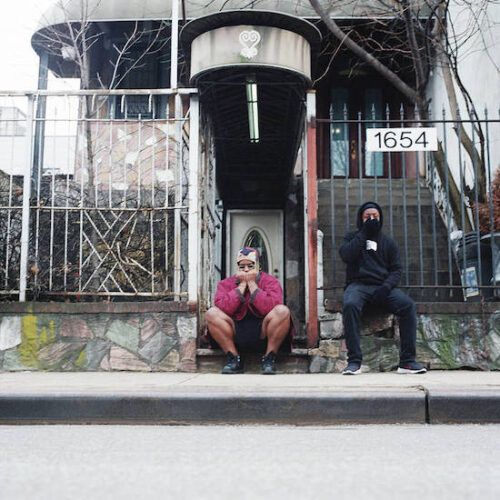The big thing some of us tend to forget about hip-hop is that it’’s inherently eclectic. In the year that the art form celebrates its 50th birthday, few listeners will need further reminding of the superhero
creation myth: Kool Herc stumbling upon the concept of the breakbeat and playing midwife to the birth of a globe-straddling music-based movement. But implicit in that narrative is that, right from the get-go, hip-hop was made up of bits of other music. Despite this structural invitation to open-minded creation, some relatively narrow ranges of source material have, at different times, come to dominate how the hip-hop of the day sounded. But habit too often becomes hegemony, and the audience ends up trying to place a stylistic straitjacket on the artists: we project ourselves and our preconceptions and expectations onto the music then wonder why we fail to find them in it.
Hip-hop changes constantly, evolves at the speed of thought – and the best, most adventurous, most stimulating and compelling hip-hop artists have always exhibited the freedom that comes from realising that their work becomes ever stronger once it can push beyond what their audience might be able to anticipate. At the dawn of its sixth decade, we might have expected a genre to be running on empty, but that is to reckon without the imagination and dedication of those who use hip-hop not as a template or a framing device but as an invitation to exploration. When your sonic palette contains the complete history of recorded sound (and isn’t even limited to that), a ravenous musical omnivorousness may be a prerequisite for greatness.
This is the venerable tradition that ELUCID and billy woods clearly stand in, and the pair’s sixth studio album marks a decade of their collaboration in some style. After an improvised live-instrument jam session with a slew of new collaborators, the pair handed over a glut of fresh musical ideas to more than a dozen producers, each clearly encouraged to bring their own skills, approaches and techniques to the table. Thus Shabaka Hutchings, an artist most closely associated with the saxophone, turns up here not just playing a flute, but, on ‘The Flexible Unreliability Of Time & Memory’, in a filtered, filleted, fragmented form, after production duo Child Actor have had their way with it. In ‘Total Recall’ Hutchings’ playing is a mellifluous, multi-tracked heat haze that shimmers across and around Kenny Segal’s beat, and then, in ‘Empire BLVD’, Willie Green turns it into an elemental force, part hurricane, part primeval howl.
Lyrically, the record is provocative and ambiguous yet conceptually pointed and precise. Communication – whether tele-, mis- or without prefix – is a prevailing preoccupation. Lines referencing judiciously selected rap icons jostle with retooled nursery rhyme motifs threaded through tracks that frequently feature fragments of phone calls: sometimes both sides, sometimes one, and, on the penultimate ‘Switchboard’, none at all, the song evaporating around a ringtone that goes unanswered. The pair’s writing is beguiling – fragmentary images are piled up in ways that at first can seem haphazard, but eventually emerge, like figures wandering amid a swirling fog, as sketchy but solid narratives.
The album title comes from the kind of sign, appended with a phone number, seen across economically disadvantaged parts of New York, fixed to wooden poles and hammered into waste ground between abandoned buildings. In the UK we might find similar totems twist-tied to chain-link fences on edge-of-town industrial estates or impaled near snarled-up road junctions – unlikely invitations to stranded passers-by to take part in spur-of-the-moment transactions of unusual intimacy with remote and anonymous strangers. The songs seem to speak of, to and from these enigmatic and unlikely conversations and the ever-proliferating non-places used to instigate them, and thus serve almost as an attempt to map our collective cultural and cognitive decay. As a vocal pairing, woods and ELUCID might recall Erick and Parrish, Rae and Ghost – but the
writing sends the listener (well, this listener, anyway) lighting out for the kind of territory we usually expect to see explored by a Gareth E Rees, a Nick Papadimitriou or an Iain Sinclair.
It’s a record of flabbergasting sonic diversity and lyrical depth and complexity – an LP that is at once ardently a work of ‘traditional’ hip-hop, and an outlier that extends and deepens the blurred margins that sit beyond the music’s usually accepted borders. The pair can do this because they know the rules well enough to understand how far each one can bend without breaking – a usually reliable indicator of those who are in complete control of their craft. Meticulously structured yet fuzzily abstract, cloudily claustrophobic yet aurally vast, it sounds nothing like a traditional rap LP yet definably and definitively adheres to the most crucial characteristics of the genre. It’s certainly a marvel and may well be a masterpiece.



